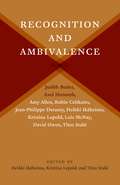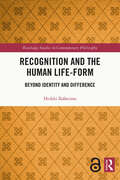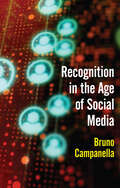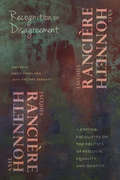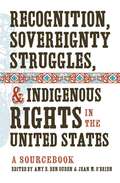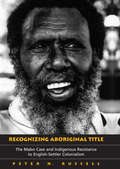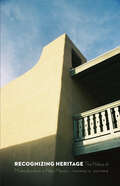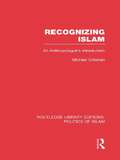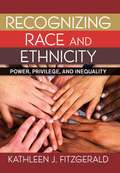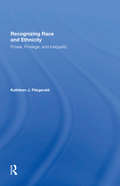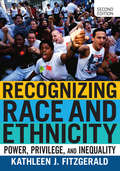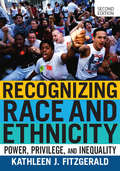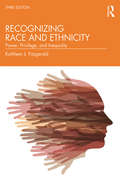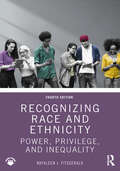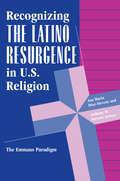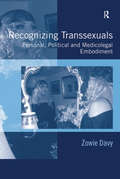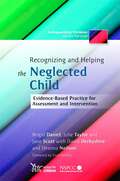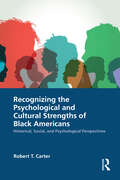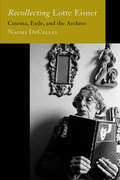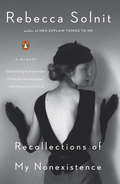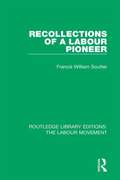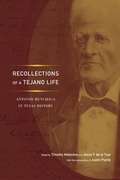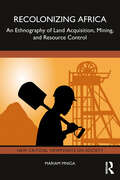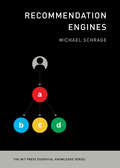- Table View
- List View
Recognition and Ambivalence (New Directions in Critical Theory #77)
by David Owen Judith Butler Amy Allen Axel Honneth Robin Celikates Jean-Philippe Deranty Lois McNayRecognition is one of the most debated concepts in contemporary social and political thought. Its proponents, such as Axel Honneth, hold that to be recognized by others is a basic human need that is central to forming an identity, and the denial of recognition deprives individuals and communities of something essential for their flourishing. Yet critics including Judith Butler have questioned whether recognition is implicated in structures of domination, arguing that the desire to be recognized can motivative individuals to accept their assigned place in the social order by conforming to oppressive norms or obeying repressive institutions. Is there a way to break this impasse?Recognition and Ambivalence brings together leading scholars in social and political philosophy to develop new perspectives on recognition and its role in social life. It begins with a debate between Honneth and Butler, the first sustained engagement between these two major thinkers on this subject. Contributions from both proponents and critics of theories of recognition further reflect upon and clarify the problems and challenges involved in theorizing the concept and its normative desirability. Together, they explore different routes toward a critical theory of recognition, departing from wholly positive or negative views to ask whether it is an essentially ambivalent phenomenon. Featuring original, systematic work in the philosophy of recognition, this book also provides a useful orientation to the key debates on this important topic.
Recognition and the Human Life-Form: Beyond Identity and Difference (Routledge Studies in Contemporary Philosophy)
by Heikki IkäheimoWhat is recognition and why is it so important? This book develops a synoptic conception of the significance of recognition in its many forms for human persons by means of a rational reconstruction and internal critique of classical and contemporary accounts. The book begins with a clarification of several fundamental questions concerning recognition. It then reconstructs the core ideas of Fichte, Hegel, Taylor, Fraser, and Honneth and utilizes the insights and conceptual tools developed across these chapters for developing a case for the universal importance of recognition for humans. It argues in favour of a universalist anthropological position, unusual in the literature on recognition, that aims to construe a philosophically sound basis for a discourse of common humanity, or of a shared human life-form for which moral relations of recognition are essential. This synthetic conception of the importance of recognition provides tools for articulating deep intuitions shared across cultures about what makes human life and forms of human co-existence better or worse, and thus tools for mutual understanding about the deepest shared concerns of humanity, or of what makes us all human persons despite our differences. Recognition and the Human Life-Form will appeal to readers interested in philosophical anthropology, social and political philosophy, critical theory, and the history of philosophy. It also provides ideas and conceptual tools for fields such as anthropology, education, disability studies, international relations, law, politics, religious studies, sociology, and social research.
Recognition in the Age of Social Media: Race, Gender, And Violence
by Bruno CampanellaThe desire to be recognized is a basic human trait. In contemporary society, social media platforms play a key role in defining how processes of recognition take shape. To post, to like, or to comment have become daily practices of expressing individual recognition. On the one hand, social media platforms make it easier for individuals to be visible and to be recognized; on the other hand, they control the structure of these dynamics. This timely and original book reflects on processes of recognition on social media platforms. Revisiting traditional discussions on recognition theory, Bruno Campanella investigates how the field of media and communication has used the concept and poses new questions raised by the omnipresence of social media. He argues that existing work does not fully explore the impact of platforms on contemporary processes of recognition. Individuals must learn new skills to make themselves visible online, but how to achieve this changes as a consequence of the role played by platforms: what is seen depends on decisions taken by their algorithms, which impacts how individuals and social groups are valued in society. Recognition in the Age of Social Media is a key contribution to the field, and a must-read for students and scholars of media and communication, sociology, and politics.
Recognition or Disagreement: A Critical Encounter on the Politics of Freedom, Equality, and Identity (New Directions in Critical Theory #30)
by Axel Honneth Jacques RancièreAxel Honneth is best known for his critique of modern society centered on a concept of recognition. Jacques Rancière has advanced an influential theory of modern politics based on disagreement. Underpinning their thought is a concern for the logics of exclusion and domination that structure contemporary societies. In a rare dialogue, these two philosophers explore the affinities and tensions between their perspectives to provoke new ideas for social and political change.Honneth sees modern society as a field in which the logic of recognition provides individuals with increasing possibilities for freedom and is a constant catalyst for transformation. Rancière sees the social as a policing order and the political as a force that must radically assert equality. Honneth claims Rancière's conception of the political lies outside of actual historical societies and involves a problematic desire for egalitarianism. Rancière argues that Honneth's theory of recognition relies on an overly substantial conception of identity and subjectivity. While impassioned, their exchange seeks to advance critical theory's political project by reconciling the rift between German and French post-Marxist traditions and proposing new frameworks for justice.
Recognition, Sovereignty Struggles, and Indigenous Rights in the United States
by Jean M. O'Brien Amy E. Den OudenThis engaging collection surveys and clarifies the complex issue of federal and state recognition for Native American tribal nations in the United States. Den Ouden and O'Brien gather focused and teachable essays on key topics, debates, and case studies. Written by leading scholars in the field, including historians, anthropologists, legal scholars, and political scientists, the essays cover the history of recognition, focus on recent legal and cultural processes, and examine contemporary recognition struggles nationwide.Contributors are Joanne Barker (Lenape), Kathleen A. Brown-Perez (Brothertown), Rosemary Cambra (Muwekma Ohlone), Amy E. Den Ouden, Timothy Q. Evans (Haliwa-Saponi), Les W. Field, Angela A. Gonzales (Hopi), Rae Gould (Nipmuc), J. Kehaulani Kauanui (Kanaka Maoli), K. Alexa Koenig, Alan Leventhal, Malinda Maynor Lowery (Lumbee), Jean M. O'Brien (White Earth Ojibwe), John Robinson, Jonathan Stein, Ruth Garby Torres (Schaghticoke), and David E. Wilkins (Lumbee).
Recognizing Aboriginal Title
by Peter H. RussellA judicial revolution occurred in 1992 when Australia's highest court discarded a doctrine that had stood for two hundred years, that the country was a terra nullius - a land of no one - when the white man arrived. The proceedings were known as the Mabo Case, named for Eddie Koiki Mabo, the Torres Strait Islander who fought the notion that the Australian Aboriginal people did not have a system of land ownership before European colonization. The case had international repercussions, especially on the four countries in which English-settlers are the dominant population: Australia, Canada, New Zealand, and the United States.In Recognizing Aboriginal Title, Peter H. Russell offers a comprehensive study of the Mabo case, its background, and its consequences, contextualizing it within the international struggle of Indigenous peoples to overcome their colonized status. Russell weaves together an historical narrative of Mabo's life with an account of the legal and ideological premises of European imperialism and their eventual challenge by the global forces of decolonization. He traces the development of Australian law and policy in relation to Aborigines, and provides a detailed examination of the decade of litigation that led to the Mabo case.Mabo died at the age of fifty-six just five months before the case was settled. Although he had been exiled from his land over a dispute when he was a teenager, he was buried there as a hero. Recognizing Aboriginal Title is a work of enormous importance by a legal and constitutional scholar of international renown, written with a passion worthy of its subject - a man who fought hard for his people and won.
Recognizing Heritage: The Politics of Multiculturalism in New Mexico
by Thomas H. GuthrieIn 2006 Congress established the Northern Rio Grande National Heritage Area to recognize the four-hundred-year “coexistence” of Spanish and Indian peoples in New Mexico and their place in the United States. National heritage areas enable local communities to partner with the federal government to promote historic preservation, cultural conservation, and economic development. Recognizing Heritage explores the social, political, and historical context of this and other public efforts to interpret and preserve Native American and Hispanic heritage in northern New Mexico. The federal government’s recognition of New Mexico’s cultural distinctiveness contrasts sharply with its earlier efforts to wipe out Indian and Hispanic cultures. Yet even celebrations of cultural difference can reinforce colonial hierarchies. Multiculturalism and colonialism have overlapped in New Mexico since the nineteenth century, when Anglo-American colonists began promoting the region’s unique cultures and exotic images to tourists. Thomas H. Guthrie analyzes the relationship between heritage preservation and ongoing struggles over land, water, and identity resulting from American colonization. He uses four sites within the heritage area to illustrate the unintentional colonial effects of multiculturalism: a history and anthropology museum, an Indian art market, a “tricultural” commemorative plaza, and a mountain village famous for its adobe architecture. Recognizing Heritage critiques the politics of recognition and suggests steps toward a more just multiculturalism that fundamentally challenges colonial inequalities.
Recognizing Islam: An Anthropologist's Introduction (Routledge Library Editions: Politics of Islam)
by Michael GilsenanIslam is more than a set of laws, rites and beliefs presented as a religious and social totality. As a word it covers a multitude of everyday forms and practices that are interwoven in complex, sometimes almost invisible ways in daily existence. Drawing exclusively on his own fieldwork in Egypt, South Arabia and the Lebanon, the author explores the nature of Islam and its impact on the daily lives of its followers; he shows that all the Western stereotypes of Islam and its practitioners need to be treated with considerable scepticism. He demonstrates also that the understanding of Islam is dependent on recognizing a variety of class tensions and oppositions within an Islamic society. These have become all the more crucial in recent years with the growth of a capitalist economy, in which the forms and functions of the state have expanded considerably. This study focuses on the social and cultural divisions between very different groups and classes, ranging from the working masses of Cairo to the new bourgeoisie of Algeria and Morocco. The accent of the book is on the forms and transformations of Islam within these different societies. The impact of colonialism is discussed in this context, and reformist and radical Islamic movements are analyzed in relation to shifting structures in class and society at large. First published in 1982.
Recognizing Race and Ethnicity
by Kathleen FitzgeraldDespite radical changes over the last century, race remains a central organizing principle in U.S. society, a key arena of inequality, and the subject of ongoing conflict and debate. In a refreshing new introduction to the sociology of race, Recognizing Race and Ethnicity encourages students to think differently by challenging the notion that we are, or should even aspire to be, color-blind. In this text, Kathleen J. Fitzgerald considers how the continuing significance of race manifests in both significant and obscure ways by looking across all racial/ethnic groups within the socio-historical context of institutions and arenas, rather than discussing each group by group. Incorporating recent research and contemporary theoretical perspectives, she guides students to examine racial ideologies and identities as well as structural racism; at the same time, she covers topics like popular culture, sports, and interracial relationships that will keep students engaged. Recognizing Race and Ethnicity provides unparalled coverage of white privilege while remaining careful to not treat "white" as the norm against which all other groups are defined. Recognizing Race and Ethnicity makes it clear that, in a time when race and racism are constantly evolving in response to varied social contexts, societal demands, and political climates, we all must learn to recognize race if we are to get beyond it.
Recognizing Race and Ethnicity
by Kathleen J. FitzgeraldDespite radical changes over the last century, race remains a central organizing principle in U. S. society, a key arena of inequality, and the subject of ongoing conflict and debate. In a refreshing new introduction to the sociology of race, Recognizing Race and Ethnicity encourages students to think differently by challenging the notion that we are, or should even aspire to be, color-blind. In this text, Kathleen Fitzgerald considers how the continuing significance of race manifests in both significant and obscure ways by looking across all racial/ethnic groups within the socio-historical context of institutions and arenas, rather than discussing each group by group. Incorporating recent research and contemporary theoretical perspectives, she guides students to examine racial ideologies and identities as well as structural racism; at the same time, she covers topics like popular culture, sports, and interracial relationships that will keep students engaged. Recognizing Race and Ethnicity provides unparalled coverage of white privilege while remaining careful to not treat "white" as the norm against which all other groups are defined. Recognizing Race and Ethnicity makes it clear that, in a time when race and racism are constantly evolving in response to varied social contexts, societal demands, and political climates, we all must learn to recognize race if we are to get beyond it.
Recognizing Race and Ethnicity, Student Economy Edition: Power, Privilege, and Inequality
by Kathleen FitzgeraldTo better reflect the current state of research in the sociology of race/ethnicity, this book places significant emphasis on white privilege, the social construction of race, and theoretical perspectives for understanding race and ethnicity.
Recognizing Race and Ethnicity: Power, Privilege, and Inequality
by Kathleen J. FitzgeraldDespite promising changes over the last century, race remains a central organizing principle in US society, a key arena of inequality, power, and privilege, and the subject of ongoing conflict and debate. In this second edition of Recognizing Race and Ethnicity, Kathleen J. Fitzgerald continues to examine the sociology of race and encourages students to think differently by challenging the notion that we are, or should even aspire to be, color-blind.Fitzgerald considers how race manifests in both significant and obscure ways by looking across all racial/ethnic groups within the socio-historical context of institutions and arenas, rather than discussing each group by group. Incorporating recent research and contemporary theoretical perspectives, she guides students to examine racial ideologies and identities as well as structural racism; at the same time, she covers topics like popular culture, sports, and interracial relationships.This latest edition includes an expanded look at global perspectives on racial inequality, including international migration and Islamophobia; updated examples of contemporary issues, including the Black Lives Matter movement; more emphasis on intersectionality, specifically the ways sexuality and race intersect; and an extended discussion on why the sociology of race and the sociological imagination matter. Recognizing Race and Ethnicity continues to reflect the latest sociological research on race/ethnicity and provides unparalleled coverage of white privilege while remaining careful not to treat "white” as the norm against which all other groups are defined.
Recognizing Race and Ethnicity: Power, Privilege, and Inequality
by Kathleen J. FitzgeraldDespite promising changes over the last century, race remains a central organizing principle in US society, a key arena of inequality, power, and privilege, and the subject of ongoing conflict and debate. In this second edition of Recognizing Race and Ethnicity, Kathleen J. Fitzgerald continues to examine the sociology of race and encourages students to think differently by challenging the notion that we are, or should even aspire to be, color-blind. Fitzgerald considers how race manifests in both significant and obscure ways by looking across all racial/ethnic groups within the socio-historical context of institutions and arenas, rather than discussing each group by group. Incorporating recent research and contemporary theoretical perspectives, she guides students to examine racial ideologies and identities as well as structural racism; at the same time, she covers topics like popular culture, sports, and interracial relationships. This latest edition includes an expanded look at global perspectives on racial inequality, including international migration and Islamophobia; updated examples of contemporary issues, including the Black Lives Matter movement; more emphasis on intersectionality, specifically the ways sexuality and race intersect; and an extended discussion on why the sociology of race and the sociological imagination matter. Recognizing Race and Ethnicity continues to reflect the latest sociological research on race/ethnicity and provides unparalleled coverage of white privilege while remaining careful not to treat "white" as the norm against which all other groups are defined.
Recognizing Race and Ethnicity: Power, Privilege, and Inequality
by Kathleen J. FitzgeraldThis best-selling textbook explains the current state of research in the sociology of race/ethnicity, emphasizing white privilege, the social construction of race, and the newest theoretical perspectives for understanding race and ethnicity. It is designed to engage students with an emphasis on topics that are meaningful to their lives, including sports, popular culture, interracial relationships, and biracial/multiracial identities and families. The new third edition comes at a pivotal time in the politics of race and identity. Fitzgerald includes vital new discussions on white ethnicities and the politics of Trump and populism. Prominent attention is given to immigration and the discourse surrounding it, police and minority populations, and the criminal justice system. Using the latest available data, the author examines the present and future of generational change. New cases studies include athletes and racial justice activism, removal of Confederate monuments, updates on Black Lives Matter, and Native American activism at Standing Rock and against the Bayou Bridge pipeline.
Recognizing Race and Ethnicity: Power, Privilege, and Inequality
by Kathleen J. FitzgeraldThis best-selling textbook explains the current state of research in the sociology of race/ ethnicity, emphasizing white privilege, the social construction of race, and the newest theoretical perspectives for understanding race and ethnicity. It is designed to engage students with an emphasis on topics that are meaningful to their lives, including sports, popular culture, interracial relationships, and biracial/multiracial identities and families.The fourth edition comes at a pivotal time in the politics of race and identity. Fitzgerald includes vital new discussions on race and technology, attacks on critical race theory and the teaching of race, racism, and privilege in schools, and ongoing police violence against people of color. Prominent attention is given to immigration and the discourse surrounding it, policing and minority populations, and the criminal justice system. Using the latest available data, the author examines the present and future of generational change. New case studies include athletes and racial justice activism, removal of Confederate monuments, updates on Black Lives Matter, and Native American activism at Standing Rock.
Recognizing The Latino Resurgence In U.s. Religion: The Emmaus Paradigm
by Ana Maria Diaz-stevensThis book delivers a knockout blow to the old notion that Latinos and Latinas are just another immigrant group waiting to be assimilated. Taking as analogy the scriptural episode of Emmaus in which Jesus walked unrecognized alongside his disciples, the authors detail how after nearly a century of unrecognized presence, the nations more than 25 million Latinos and Latinas began, in 1967, to use religion as a major source of the social and symbolic capital to fortify their identity in American society. Ana Mara Daz-Stevens and Anthony M. Stevens-Arroyo describe how this Latino Religious Resurgence has created a church-based model of multicultural pluralism that challenges the current trend of U.S. politics. }Emmaus is the biblical episode that recounts how the disciples, who had been unable to recognize the resurrected Jesus even as he traveled with them, finally come to know him as their Lord through his inspirational conversation. In this major new work exploring Latino religion, Ana Mara Daz-Stevens and Anthony M. Stevens-Arroyo compare a century-old presence of Latinos and Latinas under the U.S. flag to the Emmaus account. They convincingly argue for a new paradigm that breaks with the conventional view of Latinos and Latinas as just another immigrant group waiting to be assimilated into the U.S. The authors suggest instead the concept of a colonized people who now are prepared to contribute their cultural and linguistic heritage to a multicultural and multilingual America.The first chapter provides an overview of the religious and demographic dynamics that have contributed a specifically Latino character to the practice of religion among the 25 million plus members of what will become the largest minority group in the U.S. in the twenty-first century. The next two chapters offer challenging new interpretations of tradition and colonialism, blending theory with multiple examples from historical and anthropological studies on Latinos and Latinas. The heart of the book is dedicated to exploring what the authors call the Latino Religious Resurgence, which took place between 1967 and 1982. Comparing this period to the Great Awakenings of Colonial America and the Risorgimento of nineteenth-century Italy, the authors describe a unique combination of social and political forces that stirred Latinos and Latinas nationally. Utilizing social science theories of social movement, symbolic capital, generational change, a new mentalit, and structuration, the authors explain why Latinos and Latinas, who had been in the U.S. all along, have only recently come to be recognized as major contributors to American religion. The final chapter paints an optimistic role for religion, casting it as a binding force in urban life and an important conduit for injecting moral values into the public realm.Offering an extensive bibliography of major works on Latino religion and contemporary social science theory, Recognizing the Latino Resurgence in U. S. Religion makes an important new contribution to the fields of sociology, religious studies, American history, and ethnic and Latino studies.
Recognizing Transsexuals: Personal, Political and Medicolegal Embodiment
by Zowie DavyRecognizing Transsexuals draws on interviews with transsexuals at various stages of transition to offer an original account of transsexual embodiment and bodily aesthetics. Exploring the reasons for which transpeople desire to modify their bodies, it moves away from the focus on gender that characterizes much work on transpeople's embodiment, to investigate the concept of bodily aesthetics. Recent legislation allowing transsexuals to apply for gender recognition provides the context in which transpeople challenge the conventional understandings of what it means to be men and women. The book examines key approaches to recognizing transsexualism from within a variety of fields and considers transsexuals' bodies, body projects and embodiment in relation to personal, political and medico-legal fields. It explores the ways in which transpeople's bodily aesthetics affect social relations - such as sexual relations, acceptance by others and their families - whilst also considering contemporary political trans community organizations and their public representation of trans-bodies. Recognizing Transsexuals is the first sociological examination of how the bodies of transpeople are figured and reconfigured in socio, politico and medico-legal contexts and considers the impact of these shifts, and will be of interest to those with interests in embodiment, the sociology of law, sexology, medical sociology and gender theory.
Recognizing and Helping the Neglected Child
by Julie Taylor Brigid Daniel Jane ScottNeglect is the most common form of child abuse, but recognizing the signs, assessing the family's and the child's needs, and undertaking intervention can be difficult and complicated. This book, based on extensive research of the evidence, outlines how neglect can be recognized, examining the signs that parents give to signal their need for help, and the signs that a child's needs are not being met. It then covers how practitioners should respond, including assessment, planning, and appropriate interventions. The authors examine whether practitioners are well-equipped to recognize child neglect, and whether professional responses to help could be swifter. Finally, the prevention of child neglect is considered, and a proposal for a public health approach and early intervention is outlined. The book includes case studies and makes recommendations for policy and practice. This book will help practitioners to understand better child neglect and to improve practice in this important area. It will be vital for all those likely to encounter child neglect, including child and family social workers, health visitors, teachers with safeguarding responsibilities, nursery staff, and educational psychologists.
Recognizing the Psychological and Cultural Strengths of Black Americans: Historical, Social and Psychological Perspectives
by Robert T. CarterThis book examines the cultural beliefs and practices of Black folks in relation to psychological strength.Divided into four parts, the book begins with a discussion on the history of African civilizations, including an analysis of faiths, architecture, and cultural diversity of the continent, followed by a meaningful dialogue on the history of slavery and plantations in North America. The later sections are a study on the contribution of the African American community towards America’s prosperity. The book explores cultural values as a source of power, and uses historical, social, and psychological research to construct a framework of Black cultural values and psychological resolve. The author offers practical applications and interventions to demonstrate how this framework can be applied to training and policy matters on both individual and systemic levels.Recognizing the Psychological and Cultural Strengths of Black Americans is essential reading for students and academics in the fields of Psychology, Sociology, Critical Race Theory, Political Science, and other related disciplines. It will also be a useful resource for professionals including policy makers, psychologist, counsellors, educators, and social workers.
Recollecting Lotte Eisner: Cinema, Exile, and the Archive (Feminist Media Histories #3)
by Naomi DeCellesRecollecting Lotte Eisner provides the first in-depth examination of the remarkable transnational career of film journalist, archivist, and historian Lotte Eisner (1896–1983). From her early years as a film critic in interwar Berlin to her escape from prison in occupied France and from her role as chief curator at the Cinémathèque française to that as the mythic "collective conscience" of New German Cinema, Eisner was a prolific writer and lecturer and a pivotal voice in early film and media studies. Situated at the juncture of feminist media historiography and disciplinary intellectual history, this groundbreaking book is based on extensive multilingual archival research and the excavation of a rich corpus of previously overlooked materials. Introducing samples of Eisner's writing in translation, this volume makes some of the most important contributions of a foundational scholar in the field of film studies accessible for the first time to an English-language readership.
Recollections of My Nonexistence: A Memoir
by Rebecca Solnit"An un-self-centered book . . . At the same time that [Solnit] describes her forays into her past, she invites us to connect pieces of her story to our own, as a measure of how far we've come and how far we have left to go." --Jenny Odell, The New York Times Book Review An electric portrait of the artist as a young woman that asks how a writer finds her voice in a society that prefers women to be silentIn Recollections of My Nonexistence, Rebecca Solnit describes her formation as a writer and as a feminist in 1980s San Francisco, in an atmosphere of gender violence on the street and throughout society and the exclusion of women from cultural arenas. She tells of being poor, hopeful, and adrift in the city that became her great teacher, and of the small apartment that, when she was nineteen, became the home in which she transformed herself. She explores the forces that liberated her as a person and as a writer--books themselves; the gay community that presented a new model of what else gender, family, and joy could mean; and her eventual arrival in the spacious landscapes and overlooked conflicts of the American West. Beyond being a memoir, Solnit's book is also a passionate argument: that women are not just impacted by personal experience, but by membership in a society where violence against women pervades. Looking back, she describes how she came to recognize that her own experiences of harassment and menace were inseparable from the systemic problem of who has a voice, or rather who is heard and respected and who is silenced--and how she was galvanized to use her own voice for change.
Recollections of a Labour Pioneer (Routledge Library Editions: The Labour Movement #33)
by Francis William SoutterFirst published in 1923. This autobiographical study by Francis William Soutter, an English Radical activist and an advocate for independent labour representation in Parliament, will be of interest to anyone interested in political and social history. This title examines Soutter’s background, his fight for labour representation, and provides an extensive overview of his political activity.
Recollections of a Tejano Life: Antonio Menchaca in Texas History
by Jesús F. de la Teja Timothy MatovinaSan Antonio native, military veteran, merchant, and mayor pro tem José Antonio Menchaca (1800–1879) was one of only a few Tejano leaders to leave behind an extensive manuscript of recollections. Portions of the document were published in 1907, followed by a “corrected” edition in 1937, but the complete work could not be published without painstaking reconstruction. At last available in its entirety, Menchaca’s book of reminiscences captures the social life, people, and events that shaped the history of Texas’s tumultuous transformation during his lifetime. Highlighting not only Menchaca’s acclaimed military service but also his vigorous defense of Tejanos’ rights, dignity, and heritage, Recollections of a Tejano Life charts a remarkable legacy while incorporating scholarly commentary to separate fact from fiction. Revealing how Tejanos perceived themselves and the revolutionary events that defined them, this wonderfully edited volume presents Menchaca’s remembrances of such diverse figures as Antonio López de Santa Anna, Jim Bowie, Davy Crockett, Sam Houston, General Adrián Woll, Comanche chief “Casamiro,” and Texas Ranger Jack Hays. Menchaca and his fellow Tejanos were actively engaged in local struggles as Mexico won her independence from Spain; later many joined the fight to establish the Republic of Texas, only to see it annexed to the United States nine years after the Battle of San Jacinto. This first-person account corrects important misconceptions and brings previously unspoken truths vividly to life.
Recolonizing Africa: An Ethnography of Land Acquisition, Mining, and Resource Control (New Critical Viewpoints on Society)
by Mariam MnigaExplaining how the legacy of colonialism and the nature of the liberal economy play a significant role in the development of Africa today, keeping Africa poor and dependent, this book explains how trade liberalization, deregulation, and privatization had opened doors for the New Scramble for Africa.Green technology and the high demand for electronics have intensified Africa’s role as a supplier of raw materials, natural resources, and cheap labor and as a large market of more than one billion people in the global economy. This unique ethnographic study, with elements of autoethnography, starts with the author's journey to Bulyanhulu, Tanzania, one of the largest gold mines in Africa, and moves to a broader analysis that reveals the systemic violence of resource extraction. Focus groups, interviews, and observations demonstrate the lack of distributive justice and intersectional equality in the process of land acquisition and resource extraction, described by villagers in racialized and gendered terms as exploitative and part of a racist system that fails to provide a fair distribution of benefits to local people.Recolonizing Africa examines resource conflicts among local people, governments, and transnational corporations from Europe, North America, and Asia, revealing how global systemic violence and irresponsible business practices precipitate economic inequality between African and financially rich nations – threatening peace and security, indigenous rights, and the environment.
Recommendation Engines (The MIT Press Essential Knowledge series)
by Michael SchrageHow companies like Amazon, Netflix, and Spotify know what "you might also like": the history, technology, business, and societal impact of online recommendation engines.Increasingly, our technologies are giving us better, faster, smarter, and more personal advice than our own families and best friends. Amazon already knows what kind of books and household goods you like and is more than eager to recommend more; YouTube and TikTok always have another video lined up to show you; Netflix has crunched the numbers of your viewing habits to suggest whole genres that you would enjoy. In this volume in the MIT Press's Essential Knowledge series, innovation expert Michael Schrage explains the origins, technologies, business applications, and increasing societal impact of recommendation engines, the systems that allow companies worldwide to know what products, services, and experiences "you might also like."
